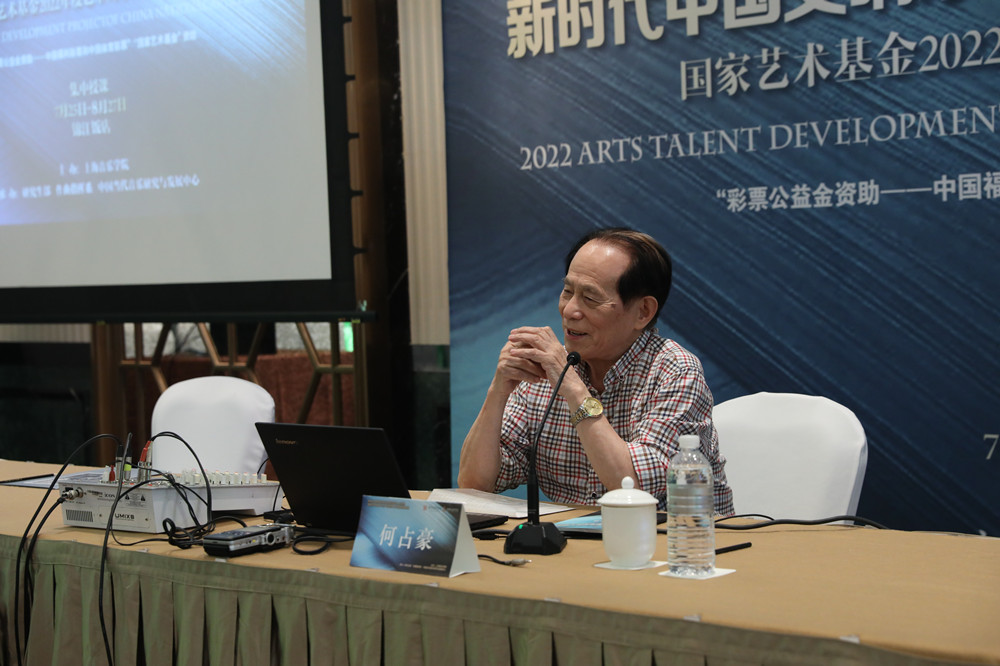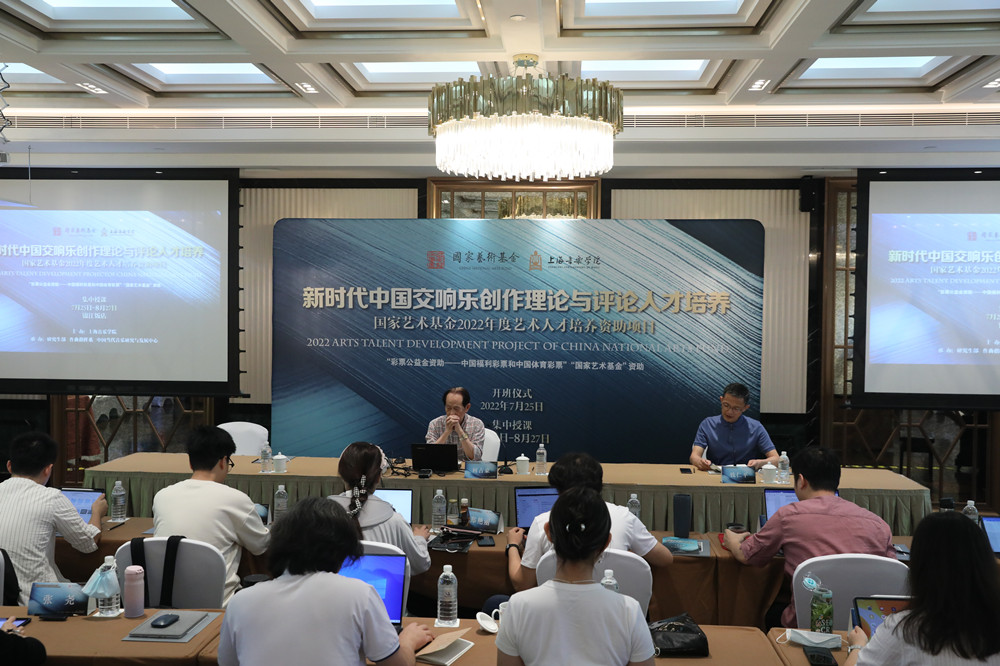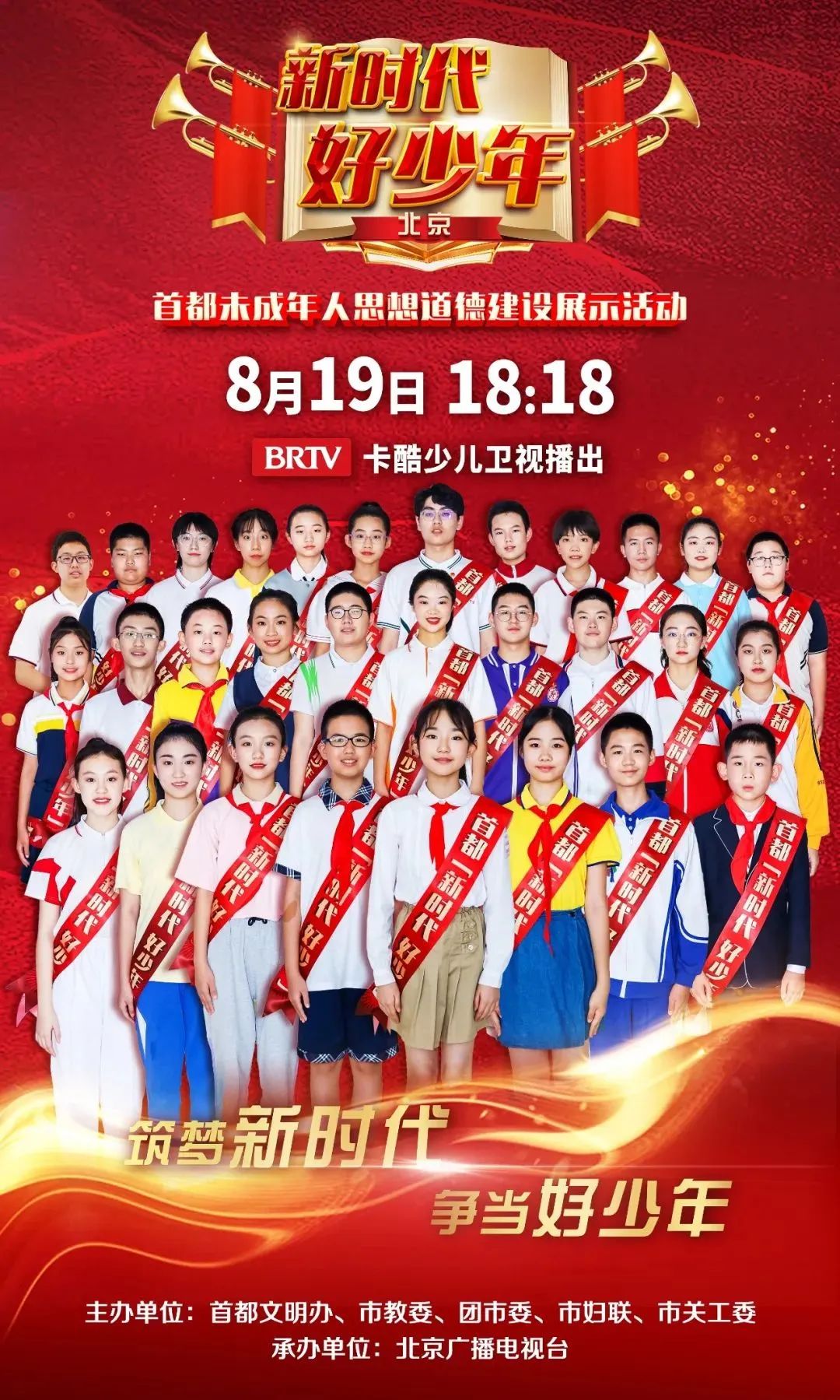He Zhanhao talks about the story of "Liang Zhu": where the love comes, where the sound is
Author:Report Time:2022.08.24

"Liang Zhu's work is two young students with incomplete knowledge and skills, which are completed under the supervision and guidance of leaders and teachers. Each era has different requirements for music workers. I hope today's composers The theorist can ask himself with the standards of morality. "On the podium, He Zhanhao, a well -known composer on the podium, is full of spirit and glory. One of the composers, he talked about the moving story behind the creation, and also looked forward to the emerging music workers.
In the 2022 National Art Fund "New Era Chinese Symphony Creation Theory and Review Talent Training" hosted by Shanghai Conservatory of Music, He Zhanhao, a professor of Shanghai Conservatory of Music, faced the students' self -study and creative experience in his youth, and talked about the violin concerto "Liang Zhu Zhu "The origin of the creative, creative process, and violin nationalization exploration.
Where is the creation of "Liang Zhu"?
What is the social and historical background created by Liang Zhu? In 1942, Mao Zedong proposed the guidance policy of "Literary and Farmer Services" in the "Speech at the Yan'an Literature and Art Symposium". In 1959, in response to the call for the "Gift to the 10th Anniversary of the Founding of the People's Republic of China", He Zhanhao and Chen Gang who were studying at the Shanghai Conservatory of Music at the time participated in the creation of the violin concerto "Liang Zhu". This work with folklore "Liang Shanbo and Zhu Yingtai" as a blueprint. It is based on the tone of the Yue drama and uses concerto tailors and orchestral bands to narrate a romantic and beautiful "love story".
On May 27, 1959, "Liang Zhu" was commanded by Fan Chengwu, and Yu Lina was a violin solo. Once this Xiaoqin concerto is performed, the audience is sensational and swept through the country. It is still one of the classic works in the history of Chinese music.
He Zhanhao believes that "Liang Zhu" is a bloody young man who loves literature and art. In a special era, he responded to the party's call and condensed the results of "collective wisdom" creation. He talked about his study experience and talked about the creation of this work in detail. He Zhanhao was admitted to the Zhejiang Provincial Cultural Troupe in 1950, transferred to the Zhejiang Yue Opera Troupe in 1952, and entered the orchestral department of Shanghai Conservatory of Music in 1957 to study violin. He mentioned that the success of "Liang Zhu" was inseparable from the following events: First, the performance of the "Sanlin Township" literary and artistic performance of the "Sanlin Township" in Shanghai, and pointed out the direction for the "Liang Zhu" for creating the people; The establishment of the National Experimental Team (He Zhanhao is the leader of the team, and members include: Ding Yinuo, Yu Lia, Shen Xiti, Zhang Xin, Zhu Ying, etc.), which laid the foundation for the creation of "Liang Zhu" with a national style; It is the leadership and composition of the Shanghai Conservatory of Music and the joining of Chen Gang, creating conditions for the creation of "Liang Zhu", which creates "Chinese and Western integration".
How does Liang Zhu say romance?
"Where is the place of love, where the sound is", how to "love" "love", and how to express the love of Liang Shanbo and Zhu Yingtai on the violin? He Zhanhao was a violin and piano performer in Zhejiang Yue Opera Troupe. He knew the program and rules of the opera. He was familiar with the tune of opera and the hand. effect.

According to He Zhanhao, the well -known "Liang Zhu" experienced two creative stages. The first stage is the origin of the theme of the "Liang Zhu" melody. In the autumn of 1958, according to the instructions of the "nationalization" and "mass" music of the "ethnicization" and "mass" music of the tee of the Shanghai Music Senior and the Secretary of the Party Branch. The story of "Liang Zhu" is the theme. First of all, the "Liang Zhu" (He Zhanhao is called "Xiao Liang Zhu"). At that time, Liu Pin commented that the melody of "Liang Zhu" ("Xiao Liang Zhu") was beautiful, but the theme was not affectionate and profound.
Later, under the encouragement of Professor He Zhanhao, under the encouragement of Meng Bo, then the party committee secretary, he was determined to return to opera music and the masses to find creative inspiration. In the end, he used the "Yue Opera" ("Dream of Red Mansions" and "Panfu Sofef") as the material, imitating the "Mianrou" chanting of Yin Guifang (the founder of Yue Opera Yin School), after repeated trials and adaptations of the violin, after the violin Create a "love theme" with the style of Vietnam. At the same time, the theme of the "Small Allegro" in the "Three Loings" is also created by adaptation through the "Yue Opera" singing section episode.
In February 1959, Ying He Zhanhao's invitation was that Chen Gang officially participated in the creation of "Liang Zhu" under the approval of the then Dean Ding Shande, and adopted the creation of the second stage of the "Liang Zhu" by class guidance and collective discussion. It is precisely because of Chen Gang's joining that it has played an important role in the curvature structure and the instrument. For example, at the beginning of the creation, the group developed the story of "Liang Zhu" as a clue and intends to use a suit structure to work. According to Chen Gang, after discussion and discussion, the two decided to adopt the structure of traditional Chinese suite and Western sonato.
Therefore, the final finalization "Liang Zhu" is based on the development of the storyline, which is divided into multiple chapters. At the same time, in the development of music, it also shows the appearance, expansion, and reproduction of the sonic style, forming a "Chinese and Western integration" music structure. The title of each chapter is as follows: "Guizi", "Grass Bridge Worship", "Three Loles of Class Winders", "Chang Ting Farewell", "British Taiwan Anti -Marriage", "Crying Spirit Confession", "Following the Butterfly in front of the grave". What kind of thinking "Liang Zhu" causes?
He Zhanhao shared his creative experience from the perspective of "violin nationalization". At that time, in order to highlight the value of the artistic creation in the cultural and artistic level of the times, and did not renew the grids of the popular aesthetic ideology, He Zhanhao and Ding Xunuo, Yu Lina, Shen Enti, etc. who were determined to create the Chinese Xiaoqin School were determined to create the Chinese Xiaoxin School. A group of people germinated the idea of "Chinese words" in violin, and created and adapted a group of string works with national characteristics, including "Liang Zhu" ("Xiao Liang Zhu"), "Erquan Yingyue" Adapted) and so on.
He Zhanhao's memories are also the trials of the string quadrilateral version of "Liang Zhu" ("Liang Liang Zhu") using an attempt to imitate opera and drag the tone. Affirmation and recognition, the experimental team thus firmly embarked on the "violin ethnicization" exploration path.
He Zhanhao also specifically mentioned his old classmates- Ding Yinuo, who "let it go if you have difficulties," and Yu Lina, the premier of "Liang Zhu" and the experimental team member of "Liang Zhu". "Liang Zhu" is the crystallization of the integrated "teaching and creation of active research" and the team's research.
In 2022, the National Art Fund "New Era Symphony Creation Theory and Review Talent Training" project was hosted by the Graduate Department of the Shanghai Conservatory of Music, the Department of Composition Command, and the China Contemporary Music Research and Development Center. The lecture was chaired by the project leader and Professor Qian Renping of Shanghai Conservatory of Music.
Author: Jiang Fang
Edit: Guo Chaohao
Editor in charge: Xuanjing
- END -
"Building a new era for a good boy" is about to be broadcast!

Hosted by the Capital Civilization Office, the Municipal Education Commission, the...
"Lone Moon" in the first weekend of nearly 1 billion yuan, July box office 3.5 billion more than the same period last year
This weekend just passed, the domestic science fiction comedy Lone Moon set off a ...